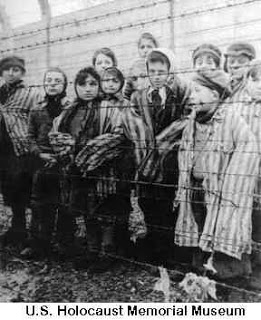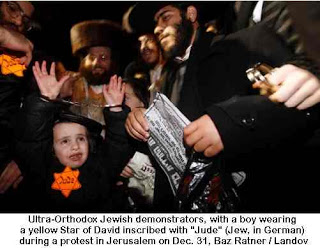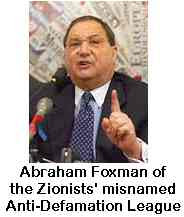According to the defunct Working Definition on Anti-Semitism that the equally defunct European Union Monitoring Committee had foisted on it, by the American Jewish Congress, comparisons of Israeli policies with Nazism is the ultimate in ‘anti-Semitism’.
In which case let us hear it loud and clear – Israel is the most anti-Semitic country in the world. ‘Nazi’ is used as a ritual term of abuse – against traffic cops, Yitzhak Rabin, Palestinians of course and indeed anyone one dislikes. But if anti-Zionists use any analogy between the Israeli State and Nazi Germany, a far more accurate comparison than one between an oppressed people and racist oppressors, then they are termed ‘anti-Semitic’.
The cause that resulted in the controversy was the practice of the Jewish Orthodox in Jerusalem segregating buses with women at the back. The practice is, of course, disgusting, but Zionists who have repeatedly used such tactics are the last ones to complain when it is used back at them.
Tony Greenstein
Below are 2 articles from Mondoweiss and one from the Daily Beast
Recently we picked up Netanyahu’s refusal to write an Op-Ed for the New York Times– his aide Ron Dermer said the paper’s columnists “cavalierly defame our country.” Well, the Anti-Defamation League has said that Netanyahu has made the wrong call, the Times is too important to ignore, though Abraham Foxman of the ADL all but accuses the New York Times of anti-Semitism:
Dermer was on to something. There has been an increasingly troubling imbalance in the way that The Times presents stories and opinions on the Middle East conflict. And, contrary to [Nahum] Barnea, who argued that being critical of Mr. Netanyahu’s policies does not make one anti-Israel, let alone anti-Semitic, some of The Times’ commentary goes beyond mere criticism.
Oh my god. So the New York Times is anti-Semitic? The charge of anti-Semitism is a vital political tool in the American discourse over Israel/Palestine. It stops debate. It was used to slow down the advance of Walt and Mearsheimer’s argument.
And note that this same smear has been the theme of the recent rightwing attacks on the Center for American Progress and Media Matters, two thinktanks associated with the Democratic Party. A former AIPAC official has accused writers at the thinktanks of being anti-Semites. He landed on, among other terms, MJ Rosenberg’s use of the phrase “Israel firster.”
Here is a brilliant response from Jerry Haber, “Hasn’t the anti-Semitic charge been trivialized enough?” Read the whole post. This is the start, dealing with the Israel firster business.
Is calling somebody an “Israel Firster” anti-Semitic? Is accusing somebody of “dual loyalty” anti-Semitic? Does it smack of anti-Semitism.to refer to Israeli “apartheid”?
Of course not, unless you want to trivialize anti-Semitism beyond belief, or unless you want to put very reasonable and widely held beliefs beyond the pale of discussion. Heck, I know personally a lot of supporters of Israel who are “Israel first”-ers. I know them; I pray with them; I have them in my classes. In fact, I know a lot of “Israel only”-ers,” I certainly have had students who are US citizens, who would never consider volunteering for the US army, but who have served in the Israel army, even without being an Israeli citizen. (Full disclosure: I have dual loyalty to the US and to Israel because I have dual-citizenship.) I have prayed in modern orthodox synagogues where the prayer for the welfare of the State of Israel has been said, but not the prayer for the welfare of the United States; or where congregants stand for the former and sit for (or mumble) the latter. I don’t agree with this practice, and I criticize such synagogues, but pointing that out doesn’t make you an anti-Semite. And by the way, if you ask people why they are more concerned with Israel than with America, they often answer that Israel is more threatened than America. Or that they love Israel more because they are Jewish. Is it anti-Semitic to point that out?
If you think that using these terms make somebody an anti-Semite or a bigot – a charge that Zionist-leaning organizations like the ADL or the AJC or members of the Zionist rightwing blogosphere (for links, see here) have recently leveled against some bloggers at the Center for American Progress, then perhaps you yourself are an anti-Semite – or at least a bigot.
You see, when somebody says what a Jew can or cannot say, when somebody says that certain discourse is considered to be hateful or insensitive and, as a result, censors or chills that speech – and when that speech is not conceptually connected with anti-Semitism — then the person who is making that discrimination is anti-Semitic, if a Jew is involved, and bigoted if a non-Jew is involved. Because the same terms said with the same intent cannot be considered anti-Semitic only when a non-Jew says them. I don’t deny that certain terms are more inappropriately said by outsider groups – the N-word comes to mind. But “inappropriately said” is a far cry from anti-Semitic.
Who decides what speech is anti-Semitic. Is there a Pope of anti-Semitism? Who are the experts? According to Commentary’s Alana Goodman, the Anti-Defamation League is “considered by many media outlets to be the final word in all things anti-Semitism” – which, by the way, is the sort of grandiose and unsubstantiated assertion that readers of Commentary may be used to, but I certainly am not. Who appointed the ADL? And do they consider Ehud Olmert and Ehud Barak, and a host of Israeli commentators anti-Semitic, when they refer to Israeli apartheid? Perhaps Israeli politicians are allowed to be bigoted? And even if the term is inaccurate, what does that have to do with anti-Semitism?
Wonderful. I keep meaning to do a post on Hannah Arendt’s and Theodor Herzl’s acknowledgment of the problem of dual loyalty, or accusations thereof. I’ll get to that in a day or so.
Even for the ultra-Orthodox, the Holocaust and Nazism are tossed blithely into political discourse. Is nothing sacred?
An Israeli protest over the weekend by ultra-Orthodox Jews who dressed their children to look like inmates at a Nazi concentration camp highlights the sometimes peculiar role the Holocaust plays there in political discourse and even in everyday exchanges.
The spectacle at a Jerusalem square Saturday night, staged by the most extreme of the ultra-Orthodox community’s myriad factions, featured mostly adults but also several dozen kids in striped uniforms and yellow stars, evoking the Holocaust’s most iconic images. The demonstrators were protesting an effort by secular Israelis to roll back gender segregation on some bus lines and in certain neighborhoods—a dispute that has surged in recent weeks.
Politicians from across the spectrum voiced outrage, as did Jewish groups in Israel and abroad, describing the display as an ugly trivialization of the Holocaust, in which 6 million Jews were murdered by Nazis and their sympathizers.
But while it amounted to the most graphic insinuation in recent memory that Israelis are somehow perpetrating Nazi-like crimes against fellow Israelis, it was hardly the first time the Holocaust has been used cynically here in a political context.
In fact, even as Israel zealously guards the memory of the genocide, many Israelis invoke it frivolously in a manner that can seem shocking to outsiders and might even be illegal in some countries (the EU has a provision against trivializing the Holocaust, as do several European countries individually).
“People in Israel misuse the Holocaust in politics and other areas all the time,” says Yehuda Bauer, a Holocaust historian and the academic adviser to Yad Vashem, Israel’s primary Holocaust memorial and museum. “It’s used mainly by the right wing but also by the left and center” to vilify political adversaries.
In its more benign form, Israelis might talk about the 1967 line that divides Israel and the West Bank as “the Auschwitz border,” or equate Iranian President Mahmoud Ahmadinejad with Adolf Hitler. Bauer recalls that during Israel’s Lebanon war in 1982, Prime Minister Menachem Begin famously likened the blockade against PLO leader Yasir Arafat in Beirut to the siege on Hitler’s bunker near the end of World War II.
It’s not uncommon to hear Israelis refer to other Israelis as Nazis. Jewish settlers regularly use the term against Israeli soldiers in the West Bank. Israeli traffic cops occasionally complain they’re called Nazis by the motorists they pull over.
“The comparisons tend to dilute the real significance of the Holocaust,” he says.
But it’s not uncommon to hear Israelis refer to other Israelis as Nazis as well. Jewish settlers regularly use the term against Israeli soldiers in the West Bank, as when troops are sent to dismantle unauthorized outposts. The late Yeshayahu Leibowitz, a well-known left-wing intellectual, once described settlers as “Judeo-Nazis.” Israeli traffic cops occasionally complain they’re called Nazis by the motorists they pull over.
Abraham Foxman, who directs the Anti-Defamation League, an American organization that fights anti-Semitism and other bigotry, says the inappropriate Holocaust references are the result of ignorance and the passage of time. He describes them as part of a worldwide phenomenon.
“Trivialization of the Holocaust is booming. Just look at our political campaign here,” he says. In one example, he cites Florida Congressman Allen West’s remark last month about how Nazi propagandist Joseph Goebbels would be “very proud” of Democrats for their misinformation campaign against Republicans.
On the other side of the globe, Foxman says, India had since November been airing a daily soap opera named Hitler Didi about a young woman whose obligations at home and work have turned her into a humorless disciplinarian. When the ADL and other groups complained, the network changed the show’s name to General Didi.
But it’s in Israel where the references seem most bewildering. The country has the largest population of Holocaust survivors in the world—some 200,000. Israel marks the genocide every year with a haunting siren that wails across the country. Yad Vashem is one of the first places foreign dignitaries are taken during official visits.
Nachman Shai, a member of Israel’s Parliament from the centrist Kadima party, said he would author a bill making trivialization of the Holocaust illegal in response to the ultra-Orthodox protest, which went on for several hours and received extensive coverage in the Israeli press. “I feel there’s a vacuum [in the legislation], and we have to fill it right away.”
Shai said the protesters displayed the most evocative symbols—including having children raise their hands to mimic an iconic photo of a Jewish boy at the Warsaw ghetto—knowing they would provoke Israelis. He said ultra-Orthodox rabbis must have authorized the stunt. “This community doesn’t do anything without the permission of the rabbis.”
Bauer, the academic adviser to Yad Vashem, says that for Jews and Israelis, misusing the Holocaust has a psychology of its own. “Israel is a traumatized society that is thrown back onto the trauma all the time,” he tells The Daily Beast. “When a society is traumatized like that, any opponent or perceived enemy is immediately equalized with the worst enemy Israel ever had.”
Shortly after reading the “Trivializing the anti-Semitism charge” post on Mondoweiss today, I came across this new Daily Beast article about the Israeli habit of trivializing the Holocaust. The article stems from the recent ultra-Orthodox rallies in Jerusalem which mimicked and exploited iconic Holocaust imagery to protest “an effort by secular Israelis to roll back gender segregation on some bus lines and in certain neighborhoods—a dispute that has surged in recent weeks.”
The article’s author, Dan Ephron, writes that “even as Israel zealously guards the memory of the genocide, many Israelis invoke it frivolously in a manner that can seem shocking to outsiders and might even be illegal in some countries (the EU has a provision against trivializing the Holocaust, as do several European countries individually).”
The litany of “misuses” of Holocaust analogies and references is familiar:
In its more benign form, Israelis might talk about the 1967 line that divides Israel and the West Bank as “the Auschwitz border,” or equate Iranian President Mahmoud Ahmadinejad with Adolf Hitler. Bauer recalls that during Israel’s Lebanon war in 1982, Prime Minister Menachem Begin famously likened the blockade against PLO leader Yasir Arafat in Beirut to the siege on Hitler’s bunker near the end of World War II.
That Ephron uses the word “benign” to describe these ridiculous comparisons is either proof of his own trivialization of the very thing he is seeking to sanctify or, more likely, evidence that he just doesn’t know the definition of the word “benign” (kindly, generous, gentle, benevolent). Surely, a benign reading of Ephron’s word choice would be to assume he meant “banal” instead (i.e. commonplace, mundane, trite, bromidic, clichéd).
He continues,
…it’s not uncommon to hear Israelis refer to other Israelis as Nazis as well. Jewish settlers regularly use the term against Israeli soldiers in the West Bank, as when troops are sent to dismantle unauthorized outposts. The late Yeshayahu Leibowitz, a well-known left-wing intellectual, once described settlers as “Judeo-Nazis.” Israeli traffic cops occasionally complain they’re called Nazis by the motorists they pull over.
Holocaust historian and Yad Vashem academic adviser Yehuda Bauer explains, “People in Israel misuse the Holocaust in politics and other areas all the time,” lamenting, “The comparisons tend to dilute the real significance of the Holocaust.”
Still, the comparisons abound. Just today, a new headline at Ha’aretz reveals that Israeli Justice Minister Yaakov Neeman has “a very hostile attitude toward the media, reportedly calling Haaretz ‘Der Sturmer’ – the Nazis’ propaganda paper.”
After quoting the ever-inane Abe Foxman and describing a new effort in the Knesset to enact anti-trivialization legislation, Ephron ends with another quote from Bauer:
“Israel is a traumatized society that is thrown back onto the trauma all the time,” he tells The Daily Beast. “When a society is traumatized like that, any opponent or perceived enemy is immediately equalized with the worst enemy Israel ever had.”
Read that again. There are two important aspects of Bauer’s observation.
First is the unassailable truth that the idea of perpetual and singular victimhood pervades Jewish Israeli society (and perhaps the American and European Jewish communities at large).
Peter Beinart, in his much-discussed 2010 New York Review of Books article, noted “In the world of AIPAC, the Holocaust analogies never stop, and their message is always the same: Jews are licensed by their victimhood to worry only about themselves.”
Last year, Israeli Prime Minister Netanyahu used a nearly identical formulation is his speech to an obsequious U.S. Congress. “As for Israel, if history has taught the Jewish people anything, it is that we must take calls for our destruction seriously,” he bellowed. “We are a nation that rose from the ashes of the Holocaust. When we say never again, we mean never again. Israel always reserves the right to defend itself.”
As this writer has pointed out before, Netanyahu’s turn of phrase is ironic considering the title of former Knesset speaker Avraham Burg’s 2008 book, “The Holocaust Is Over; We Must Rise From Its Ashes,” in which Burg exposes the purpose of playing the victim. “Victimhood sets you free,” he writes.
Furthermore, over thirty years ago, in 1980, Israeli journalist Boaz Evron put it another way: “If we assume the world hates us and persecutes us, we feel exempted from the need to be accountable for our actions towards it.”
Though Bauer, as quoted in Ephron’s article, suggests that Israel is “thrown back onto trauma all the time,” Israeli professor and historian Avi Shlaim addressed that particular formulation almost exactly three years ago as Israeli bombs, bullets, and white phosphorous tore Gaza and hundreds of Palestinian men, women, and children to shreds. He wrote in The Guardian:
“As always, mighty Israel claims to be the victim of Palestinian aggression but the sheer asymmetry of power between the two sides leaves little room for doubt as to who is the real victim. This is indeed a conflict between David and Goliath but the Biblical image has been inverted – a small and defenceless Palestinian David faces a heavily armed, merciless and overbearing Israeli Goliath. The resort to brute military force is accompanied, as always, by the shrill rhetoric of victimhood and a farrago of self-pity overlaid with self-righteousness. In Hebrew this is known as the syndrome of bokhim ve-yorim, “crying and shooting”.
Seven months before that, in May 2008, Uri Avnery observed that
the Palestinians are suffering from several cruel strokes of fate: The people that oppress them claim for themselves the crown of ultimate victimhood. The whole world sympathizes with the Israelis because the Jews were the victims of the most horrific crime of the Western world. That creates a strange situation: the oppressor is more popular than the victim. Anyone who supports the Palestinians is automatically suspected of anti-Semitism and Holocaust denial.
The second interesting aspect of Bauer’s concluding quote is that the Nazis, who were in power from 1933 to 1945, are described as “the worst enemy Israel ever had.” Israel was founded in 1948. Bauer is clearly – though perhaps unconsciously – equating “Israel” with “Jews” and utilizes his own Holocaust reference to reconstruct history and erase Palestinian existence altogether.
In so doing, Bauer conforms his worldview to the epitome of Netanyahu’s Zionist chauvinism: Israel is a “Jewish State” that rose from the ashes of the Holocaust, rather than one built – violently, colonially, and deliberately – atop the ruins of Palestine.



